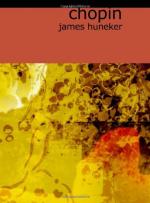Of course, Constantia sang wonderfully. “Her low B came out so magnificently that Zielinski declared it alone was worth a thousand ducats.” Ah, these enamored ones! Chopin left Warsaw November 1, 1830, for Vienna and without declaring his love. Or was he a rejected suitor? History is dumb. He never saw his Gladowska again, for he did not return to Warsaw. The lady was married in 1832—preferring a solid certainty to nebulous genius--to Joseph Grabowski, a merchant at Warsaw. Her husband, so saith a romantic biographer, Count Wodzinski, became blind; perhaps even a blind country gentleman was preferable to a lachrymose pianist. Chopin must have heard of the attachment in 1831. Her name almost disappears from his correspondence. Time as well as other nails drove from his memory her image. If she was fickle, he was inconstant, and so let us waste no pity on this episode, over which lakes of tears have been shed and rivers of ink have been spilt.
Chopin was accompanied by Elsner and a party of friends as far as Wola, a short distance from Warsaw. There the pupils of the Conservatory sang a cantata by Elsner, and after a banquet he was given a silver goblet filled with Polish earth, being adjured, so Karasowski relates, never to forget his country or his friends wherever he might wander. Chopin, his heart full of sorrow, left home, parents, friends, and “ideal,” severed with his youth, and went forth in the world with the keyboard and a brain full of beautiful music as his only weapons.
At Kaliz he was joined by the faithful Titus, and the two went to Breslau, where they spent four days, going to the theatre and listening to music. Chopin played quite impromptu two movements of his E minor concerto, supplanting a tremulous amateur. In Dresden where they arrived November 10, they enjoyed themselves with music. Chopin went to a soiree at Dr. Kreyssig’s and was overwhelmed at the sight of a circle of dames armed with knitting needles which they used during the intervals of music-making in the most formidable manner. He heard Auber and Rossini operas and Rolla, the Italian violinist, and listened with delight to Dotzauer and Kummer the violoncellists—the cello being an instrument for which he had a consuming affection. Rubini, the brother of the great tenor, he met, and was promised important letters of introduction if he desired to visit Italy. He saw Klengel again, who told the young Pole, thereby pleasing him very much, that his playing was like John Field’s. Prague was




